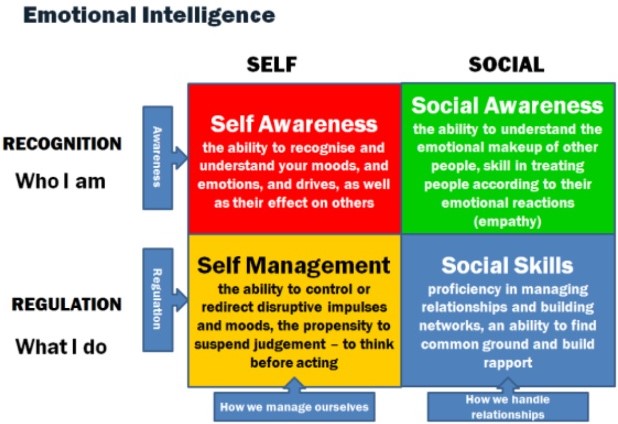The four emotional intelligence (EQ) skills fall under two primary competencies personal competence (how we manage ourselves) and social competence (how we handle relationships).
Self-Awareness the ability to recognise and understand your mood, emotions and drives, as well as their effect on others. Development of this skill is through paying attention to how others influence your emotional state. These observations improve your self-awareness of your emotional state and how your behaviour impacts others. Looking inward and focusing on ‘Who I am’ promotes self-confidence particularly when dealing with difficult people or situations.
Self-Management is the ability to control or redirect disruptive impulses and moods, the propensity to suspend judgement – to think before acting. Regulation of your emotions and responses to situations improves relationships. Self-management skills allow you to express your ideas and handle conflict constructively and openly; improves your ability to get along with others.
Social Awareness is the capacity to understand the emotional makeup of other people, treating people according to their emotional reactions and expressing empathy towards others, utilising sensitivity to other’s feelings and showing sincere concern, understanding and empathy cultivate positive relationships.
Relationship Management is proficiency in managing relationships and building networks and an ability to find common ground and build rapport. Getting along well with others is imperative in all aspects of our lives. Truly understanding the needs of others, without jeopardising your needs, assists in maintaining relationships within your personal and professional life. Social skills and relationship building improves your ability to collaborate effectively with groups and teams.

Developing Your EQ Skills
The good news is, unlike IQ you can improve your EQ. In fact, people with the highest levels of intelligence (IQ) outperform those with average IQs put high EQ just 20% of the time, while people with average IQs and high EQ outperform those with high IQs 70% of the time. Improving your EQ will enhance success in many aspects of your life.
The only way to understand your emotions and which EQ skills need developing is by spending time thinking about them and reflecting on them. Keeping a journal on your feelings, your responses to situations and your triggers help you to understand yourself better. Self-reflection is the first step to improving your EQ skills. Start with a quick self-assessment using the chart below tick of the skills you feel you have and identify the areas you feel need improvement:

Development of your Emotional Intelligence (EQ) is one of the many characteristics Transitional Support assesses to help you to create a shift in your life. Transitional Support practitioners help you to identify the social skills that need developing and supports you to develop your EQ and learn how to implement these skills into your daily life.



